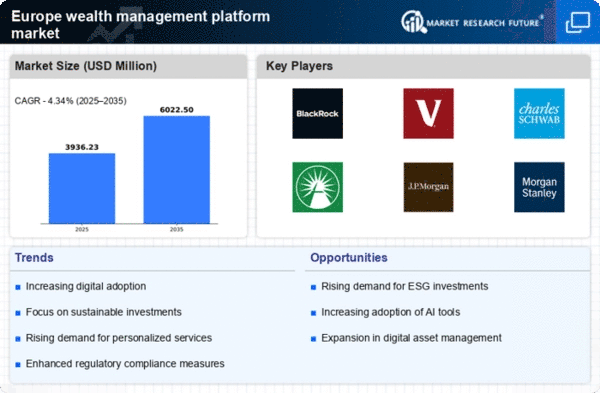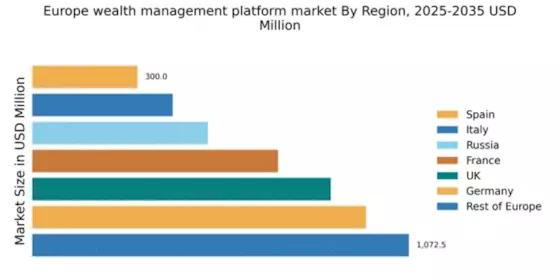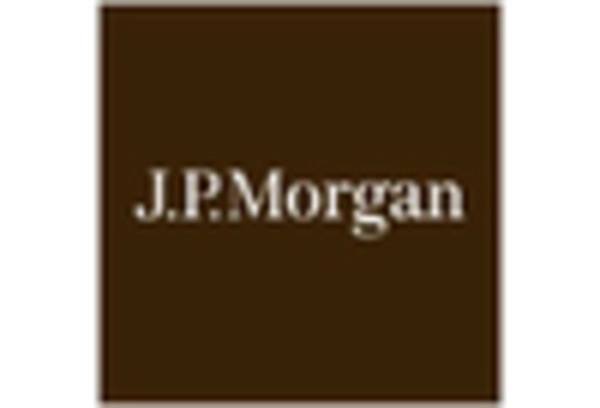Rising Affluence in Europe
The increasing affluence among European populations is a pivotal driver for the wealth management-platform market. As disposable incomes rise, more individuals seek sophisticated financial services to manage their growing assets. Recent data indicates that the number of high-net-worth individuals (HNWIs) in Europe has surged, with estimates suggesting a growth of approximately 8% annually. This trend creates a burgeoning client base for wealth management platforms, which are increasingly tailored to meet the unique needs of affluent clients. Furthermore, as wealth becomes more concentrated, the demand for personalized investment strategies and comprehensive financial planning services intensifies. Consequently, wealth management firms are compelled to enhance their digital offerings, ensuring they remain competitive in a rapidly evolving market landscape.
Evolving Client Expectations
The wealth management-platform market is increasingly shaped by evolving client expectations, particularly among younger investors. Millennials and Generation Z are entering the wealth accumulation phase, bringing with them distinct preferences for investment management. These demographics tend to favor platforms that offer transparency, low fees, and user-friendly interfaces. Data suggests that nearly 70% of younger investors prioritize digital access to their portfolios and real-time performance tracking. As a result, wealth management firms are adapting their services to cater to these preferences, often incorporating gamification and social investing features. This shift not only enhances client satisfaction but also drives competition among platforms to innovate and differentiate their offerings in a crowded market.
Increased Regulatory Scrutiny
The wealth management-platform market is currently navigating an environment of heightened regulatory scrutiny in Europe. Regulatory bodies are implementing stricter compliance measures aimed at protecting investors and ensuring market integrity. For instance, the European Union's Markets in Financial Instruments Directive II (MiFID II) has introduced more rigorous reporting and transparency requirements for financial services. This regulatory landscape compels wealth management firms to invest in compliance technologies and processes, which can be costly but necessary for maintaining operational legitimacy. Firms that proactively adapt to these regulations may gain a competitive edge, as they can assure clients of their commitment to ethical practices and transparency. Thus, the increased regulatory scrutiny is a significant driver influencing the strategic direction of the wealth management-platform market.
Digital Transformation Initiatives
The ongoing digital transformation across various sectors significantly influences the wealth management-platform market. Financial institutions in Europe are increasingly adopting advanced technologies such as artificial intelligence (AI), machine learning, and blockchain to enhance service delivery and operational efficiency. Reports indicate that over 60% of wealth management firms are investing in digital tools to improve client engagement and streamline processes. This shift not only facilitates better data management but also allows for more personalized client interactions, which are crucial in retaining and attracting clients. As clients become more tech-savvy, their expectations for seamless digital experiences rise, compelling firms to innovate continuously. Thus, the digital transformation initiatives are likely to reshape the competitive landscape of the wealth management-platform market.
Focus on Sustainable Investment Solutions
The growing emphasis on sustainable investment solutions is reshaping the wealth management-platform market. European investors are increasingly prioritizing environmental, social, and governance (ESG) factors in their investment decisions. Recent surveys indicate that over 75% of European investors express a preference for sustainable investment options, reflecting a broader societal shift towards responsible investing. Wealth management platforms are responding by integrating ESG criteria into their investment strategies and product offerings. This trend not only aligns with client values but also opens new avenues for growth, as firms that offer sustainable investment solutions may attract a broader client base. Consequently, the focus on sustainable investment solutions is likely to play a crucial role in the evolution of the wealth management-platform market.


















